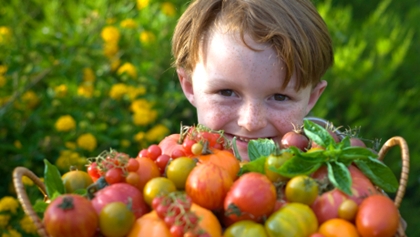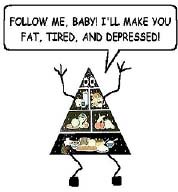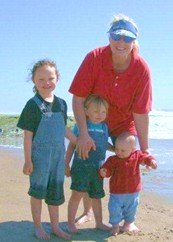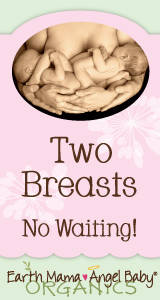Balanced Healthy Diet

Are you asking yourself what exactly is a balanced healthy diet? Are you overwhelmed by all of the diet information out there and wondering what you should be eating and what you should be feeding your children? Here we make it simple for you!
Currently there is a lot of misinformation circulating regarding what comprises a healthy diet. We won’t go into the politics behind the problem in detail here, but suffice to say that the money that large food processing corporations "donate" heavily influences both our political and regulatory processes at the moment. As a result the current USA Dietary Guidelines are both unscientific and unhealthy.

Following the USDA’s Pyramid is almost guaranteed to make your children obese at the same time they will lack the basic nutrients they need for optimal brain development. The USDA’s promotion of a grain and carbohydrate heavy diet has resulted in children that are addicted to sugary, starchy foods and have chronically elevated insulin levels which puts them at risk for diabetes, hypertension and heart disease.
For an impeccably reported look at how American food manufacturers and their "products" may be endangering our minds, read The Crazy Makers: How the Food Industry Is Destroying Our Brains and Harming Our Children by Carol N. Simontacchi. While the title initially sounds overly dramatic, after reading the book and the research presented in it, you will see that it isn’t.
You are likely reading this because you recognize that a tremendous number of children are suffering from chronic disease and learning disorders. With a little research it is easy to understand that what your children eat will have a huge influence over their health and well being. You can’t expect to put bad gas into your car and have it still run smoothly, correct? You recognize that something is wrong.
Worse yet, even the healthiest foods can be toxic if you do not get the organic or free-range varieties.
There are a tremendous number of toxins in the food supply nowadays. Between the hormones injected into animals, the toxins sprayed on crops and the artificial ingredients and colors in processed foods, our bodies are being exposed to a multitude of potentially harmful chemicals that didn't exist 40 years ago. Many have been associated with cancer and other health ailments.
For children, whose rapidly growing bodies are especially vulnerable to chemicals, many attention disorders and ailments are linked to these toxins. For these reasons, we recommend that you only eat organic food. You should also avoid all processed and packaged foods as they contain unhealthy chemicals, including MSG, a neurotoxin, often labeled as “natural flavors”.
Let’s talk about what foods you should be eating and how much you should eat as part of a balanced healthy diet.
We recommend that you eat the following everyday as part of your balanced healthy diet
For an interesting perspective about WHY you should eat the following every day as part of a balanced, healthy diet, read Principles of Healthy Diets.
To read more about how good nutrition during pregnancy can protect your baby from diabetes, stroke, heart disease, kidney disease, and memory loss later in life read Healthy Pregnancy Diet.
Protein
Consume 80-100 grams of complete protein per day. You should plan to have at least ONE protein food at every meal. This is important as part of your balanced healthy diet because it will prevent blood sugar fluctuations. Good sources of protein include organic free-range chicken, organic grass fed beef, organic grass fed lamb, organic pork, wild caught salmon from Alaska, organic raw whole milk or organic whole pasteurized (but not homogenized milk). For information about raw milk.
Your protein intake should include:
- You should have at least ONE serving of beef, or lamb every day
- Drink at least FOUR 8-ounce glasses of milk per day
- You should also consume TWO free-range, organic chicken eggs and TWO additional egg yolks
- You should have at least ONE serving of wild caught salmon from Alaska per week

Green Vegetables
- You should consume at least TWO servings of green vegetables every day as part of your balanced healthy diet. Good choices include steamed spinach, chard, broccoli, and fresh baby salad greens.
- You get extra credit for ONE serving of a lacto-fermented vegetables (like sauerkraut and pickles) each day.
Healthy Fats
In addition to the fats you consume eating protein as recommended above, your balanced healthy diet should include the following additional healthy fats. Like protein, fats are critical for preventing large blood sugar swings.
- FOUR tablespoons of butter per day, preferably from pasture-fed cows
- TWO tablespoons of expeller pressed organic coconut oil per day. Our favorites are Radiant Life True Virgin Coconut Oil and Artisana 100% Organic Raw Coconut Oil available at Whole Foods.
- TWO teaspoons of Cod Liver Oil per day. Our favorites are Blue Ice Fermented Cod Liver Oil and Blue Ice Fermented Cod Liver Oil and High Vitamin Butter Blend available at Radiant Life
Soaked Whole Grains
It is important that the grains you consume are properly prepared so that the antinutrients and enzyme inhibitors have been neutralized. For more information about this read Be Kind to Your Grains…And Your Grains Will Be Kind To You.
- ONE serving of Oatmeal using thick rolled or steel cut oats that have been soaked water with a couple tablespoons of in lemon juice overnight. For how to prepare healthy porridge get Nourishing Traditions, a great cookbook about how to prepare traditional foods.
- ONE serving of organic sprouted or sour dough whole grain bread with butter or cheese. Our favorite is Sprouted Organic 100% Whole Grain Ezekiel 4:9 Cinnamon Raisin Bread (available at Whole Foods) lightly toasted, slathered with butter and organic peanut.
Fresh Fruit
Fresh Fruit is an important part of your balanced healthy diet because it contains vitamin C. Be sure to choose organic as fruits are heavily sprayed.
- Eat ONE serving per day of a citrus fruit or other fruit high in vitamin c. Excellent choices include organic oranges, strawberries, and kiwi fruit.
Salt
Salt your food to taste with natural sea salt throughout your pregnancy. Salt is an important part of a balanced healthy diet. Unlike you may have heard, salt does not promote water retention. Our favorite brand is Real Salt which we purchase at Whole Foods.
- Salt your food to taste.
Fluids
- Be sure to drink at least a QUART of filtered or spring water each day as part of your balanced healthy diet.
- Drink 3-8oz glasses or raw organic milk as described above under the protein section.
- At least ONE serving per week - of homemade Bone Broths as prepared in Nourishing Traditions. Bone broths are a great source of nutrients and calcium, while also soothing for your stomach. During winter months in particular, we suggest you have soup made with homemade bone broth at least ONCE a week. Canned broth invariably contains MSG, a potent neurotoxin - so be sure to make your own.

Avoid Eating ANY of the Following
Our balanced healthy diet would not be complete without a discussion about what not to consume. Everything listed below is unhealthy for both you and your children and should not be part of your normal diet.
- Trans fatty acids (e.g. hydrogenated oils)
- Junk food
- Egg substitutes
- Commercial fried foods
- Sugar
- White flour
- Soft drinks
- Caffeine
- Alcohol
- Cigarettes
- Drugs (even prescription drugs, if possible)
Recommended Reading
One of our favorite book is the enduring classic work on how what we eat shapes us, for better or worse, titled Nutrition and Physical Degeneration by Weston A. Price, D.D.S.
In addition, there are many great articles on the Weston A Price website about diet and nutrition including:
- Principles of Healthy Diets
- Ancient Dietary Wisdom for Tomorrow’s Children by Sally Fallon Morell
What Would You Like To Do Next?
Read more about the Importance of a Healthy Diet, especially for babies, children and nursing moms.
Read more about Traditional, Nutrient Dense and Organic Diets as well as the importance of consuming unrefined eating.
See some Healthy Crock Pot Recipes that can make meal preparation easy at the same time you provide your family nutritious eating.
Read tips for encouraging your kids to eat healthy eating (coming soon)
Read about Fun Activities to do with your kids.










New! Facebook Comments
Tell us what you think!